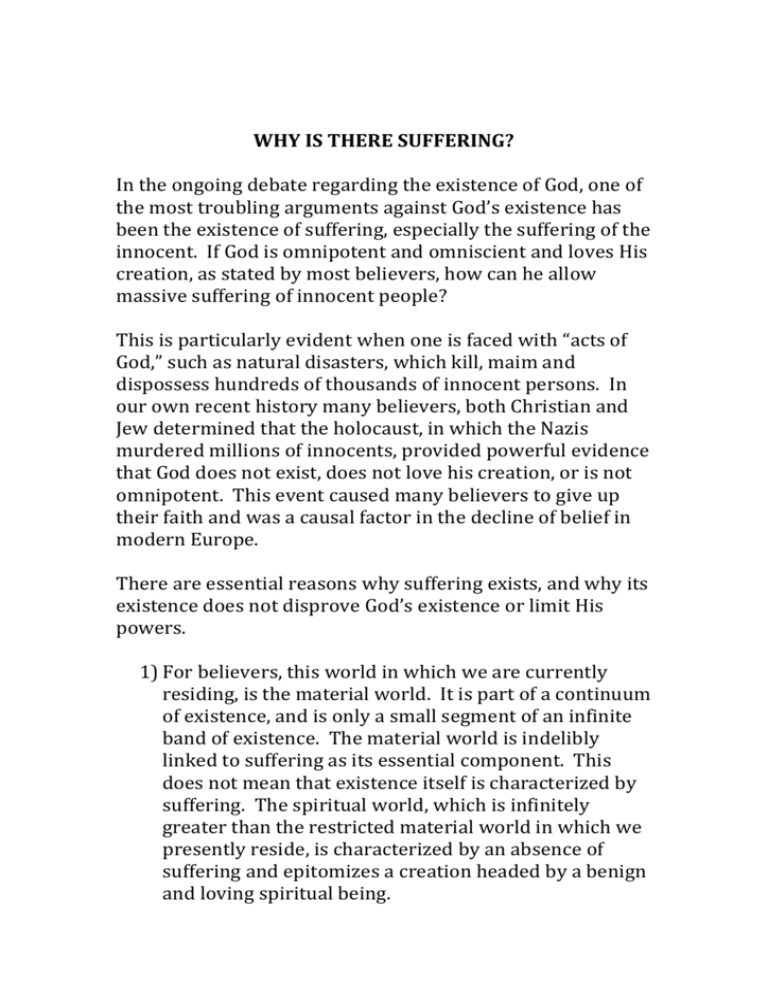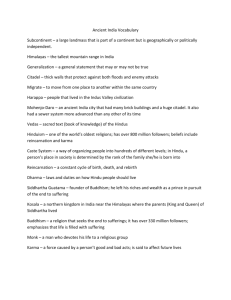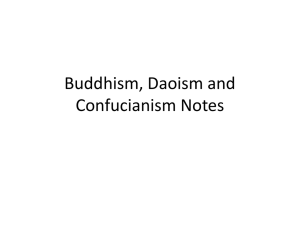why-is-there
advertisement

WHY IS THERE SUFFERING? In the ongoing debate regarding the existence of God, one of the most troubling arguments against God’s existence has been the existence of suffering, especially the suffering of the innocent. If God is omnipotent and omniscient and loves His creation, as stated by most believers, how can he allow massive suffering of innocent people? This is particularly evident when one is faced with “acts of God,” such as natural disasters, which kill, maim and dispossess hundreds of thousands of innocent persons. In our own recent history many believers, both Christian and Jew determined that the holocaust, in which the Nazis murdered millions of innocents, provided powerful evidence that God does not exist, does not love his creation, or is not omnipotent. This event caused many believers to give up their faith and was a causal factor in the decline of belief in modern Europe. There are essential reasons why suffering exists, and why its existence does not disprove God’s existence or limit His powers. 1) For believers, this world in which we are currently residing, is the material world. It is part of a continuum of existence, and is only a small segment of an infinite band of existence. The material world is indelibly linked to suffering as its essential component. This does not mean that existence itself is characterized by suffering. The spiritual world, which is infinitely greater than the restricted material world in which we presently reside, is characterized by an absence of suffering and epitomizes a creation headed by a benign and loving spiritual being. 2) Another essential component of the material world is time. Time is determined by the finite nature of everything within the material world. Physics has determined that everything in our current universe is subject to decay and dissolution. The spiritual world, by contrast is beyond the confines of time. Since everything in the material world is finite, the suffering endured by beings in the material world is also finite. The finite amount of suffering we experience can provide us with motivation to renew our relationship with God and escape our present mode of existence. Does this mean that suffering can serve a purpose? Many theologians have made this argument. 3) Why does suffering characterize the material world? God desires to engage in an eternal reciprocal loving relationship with us. However, such a relationship cannot take place without free will. God is omnipotent and created the spiritual world where these loving relationships could take place eternally. All the creatures that reside in the spiritual world have free will. This means that they have the freedom to opt out of a reciprocal loving relationship with God. 4) A being is most likely to choose to opt out of such a relationship because he does not want to subordinate himself to God, and prefers to exercise free will and reject God. In order for free will to exist, God must allow a plane of existence for beings desiring this option. This is our present material world. 5) In order for our present plane of existence to serve its purpose it must not be readily apparent that God exists, while suffering is evident all around us. The reason why this suffering exists is because God must, by definition, not intervene to completely eliminate suffering. If he chose to do so, He would remove the essential element and purpose of the material world. Everyone in the world would immediately see overwhelming evidence of God’s existence and role in the universe and there would be no free will. 6) God must allow suffering to exist in our world, because otherwise, our relationship with Him would not be based on our own free will. Although we must endure suffering, we continue to have free will and the option to renounce the Lord and go our own way. 7) What we call “faith” is the personal realization that God exists, that we have chosen to fall into a material existence characterized by suffering, and that we want to freely enter into a reciprocal relationship with God to permanently escape our circumstances. The motivation for entering into such a relationship should not be based purely on a desire to escape from suffering (although this is a rational and logical desire of any intelligent being). Rather, we realize that renouncing our relationship with God and choosing to go it alone is an empty promise that ties us to continued suffering and prevents us from experiencing the genuine joy of a reciprocal loving relationship with God. 8) Because suffering exists in the world, it does not necessary logically follow that God does not exist or does not love us. Rather, those who have decided to make the “leap of faith” start to view their existence in a different way. They come to see that God does not take a completely “hands off” stance regarding the material world, but rather actively intervenes. To persons of faith God displays and demonstrates His mercy for those who are suffering and provides relief and a way out of that suffering. However, He does not intervene in a way that would contradict the need for free will. That is why evidence for God’s intervention to relieve suffering is not readily apparent and is also a matter of faith.






